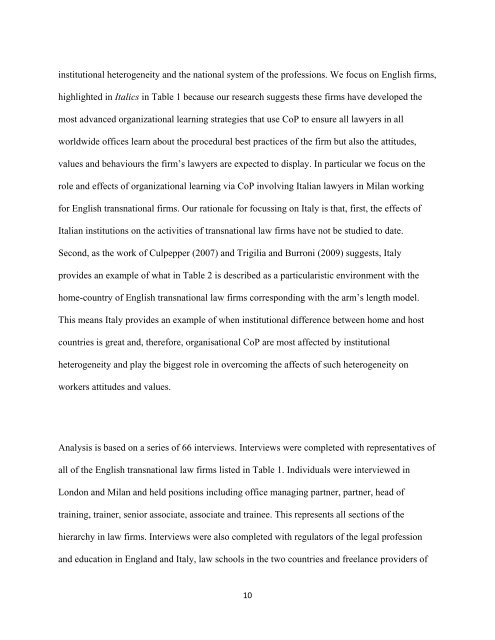Learning to be a lawyer in transnational law firms: communities of ...
Learning to be a lawyer in transnational law firms: communities of ...
Learning to be a lawyer in transnational law firms: communities of ...
Create successful ePaper yourself
Turn your PDF publications into a flip-book with our unique Google optimized e-Paper software.
<strong>in</strong>stitutional heterogeneity and the national system <strong>of</strong> the pr<strong>of</strong>essions. We focus on English <strong>firms</strong>,<br />
highlighted <strong>in</strong> Italics <strong>in</strong> Table 1 <strong>be</strong>cause our research suggests these <strong>firms</strong> have developed the<br />
most advanced organizational learn<strong>in</strong>g strategies that use CoP <strong>to</strong> ensure all <strong><strong>law</strong>yer</strong>s <strong>in</strong> all<br />
worldwide <strong>of</strong>fices learn about the procedural <strong>be</strong>st practices <strong>of</strong> the firm but also the attitudes,<br />
values and <strong>be</strong>haviours the firm’s <strong><strong>law</strong>yer</strong>s are expected <strong>to</strong> display. In particular we focus on the<br />
role and effects <strong>of</strong> organizational learn<strong>in</strong>g via CoP <strong>in</strong>volv<strong>in</strong>g Italian <strong><strong>law</strong>yer</strong>s <strong>in</strong> Milan work<strong>in</strong>g<br />
for English <strong>transnational</strong> <strong>firms</strong>. Our rationale for focuss<strong>in</strong>g on Italy is that, first, the effects <strong>of</strong><br />
Italian <strong>in</strong>stitutions on the activities <strong>of</strong> <strong>transnational</strong> <strong>law</strong> <strong>firms</strong> have not <strong>be</strong> studied <strong>to</strong> date.<br />
Second, as the work <strong>of</strong> Culpepper (2007) and Trigilia and Burroni (2009) suggests, Italy<br />
provides an example <strong>of</strong> what <strong>in</strong> Table 2 is descri<strong>be</strong>d as a particularistic environment with the<br />
home-country <strong>of</strong> English <strong>transnational</strong> <strong>law</strong> <strong>firms</strong> correspond<strong>in</strong>g with the arm’s length model.<br />
This means Italy provides an example <strong>of</strong> when <strong>in</strong>stitutional difference <strong>be</strong>tween home and host<br />
countries is great and, therefore, organisational CoP are most affected by <strong>in</strong>stitutional<br />
heterogeneity and play the biggest role <strong>in</strong> overcom<strong>in</strong>g the affects <strong>of</strong> such heterogeneity on<br />
workers attitudes and values.<br />
Analysis is based on a series <strong>of</strong> 66 <strong>in</strong>terviews. Interviews were completed with representatives <strong>of</strong><br />
all <strong>of</strong> the English <strong>transnational</strong> <strong>law</strong> <strong>firms</strong> listed <strong>in</strong> Table 1. Individuals were <strong>in</strong>terviewed <strong>in</strong><br />
London and Milan and held positions <strong>in</strong>clud<strong>in</strong>g <strong>of</strong>fice manag<strong>in</strong>g partner, partner, head <strong>of</strong><br />
tra<strong>in</strong><strong>in</strong>g, tra<strong>in</strong>er, senior associate, associate and tra<strong>in</strong>ee. This represents all sections <strong>of</strong> the<br />
hierarchy <strong>in</strong> <strong>law</strong> <strong>firms</strong>. Interviews were also completed with regula<strong>to</strong>rs <strong>of</strong> the legal pr<strong>of</strong>ession<br />
and education <strong>in</strong> England and Italy, <strong>law</strong> schools <strong>in</strong> the two countries and freelance providers <strong>of</strong><br />
10
















